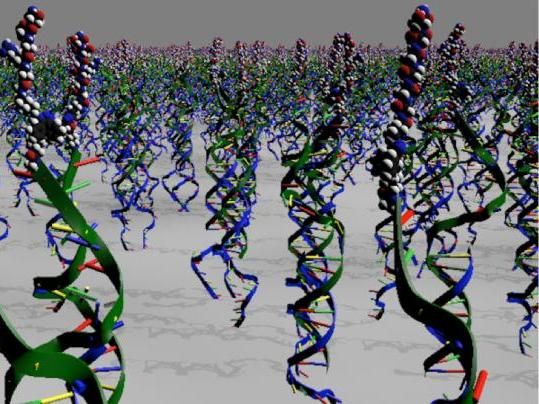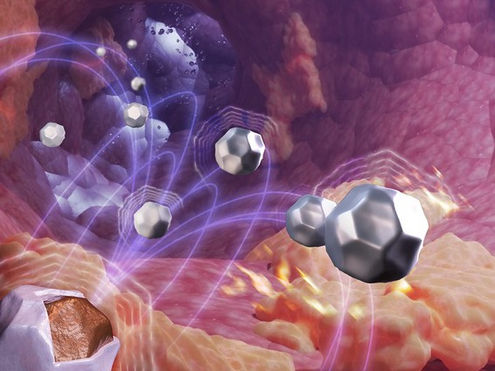From mirror-image biology to enhanced therapeutic proteins
Scientists from the German Cancer Research Center (DKFZ) have succeeded in reconstructing biomolecules in their mirror-image form. The researchers' goal is to create a mirror-image artificial protein synthesis system. Their aim is to produce mirror-image therapeutic proteins, such as antibodies, which would be protected from biological breakdown in the body and do not provoke any immune response.

Hands - a prime example of mirror-image biology
Poison_Ivy, pixabay.com, CC0
Almost all biological molecules exist as two different spatial structures that are related to each other like image and mirror image. These molecules are referred to as enantiomers. Much like one's right and left hands, they cannot be superimposed on each other. Depending on the direction in which the molecules rotate passing polarized light, they are termed D-enantiomers (to the right) or L-enantiomers (to the left). While almost all proteins found in nature are made up of L-amino acids, DNA and RNA are built from D-molecules.
Scientists from the German Cancer Research Center (DKFZ) in Heidelberg are working to synthesize biomolecules in their mirror-image form. In future, they intend to build more than single molecules: "Our long-term goal is to create simple, artificial biological systems in mirror-image form that corresponds to those in nature but do not interact with the environment," says project leader Jörg Hoheisel.
In their present work, the scientists led by Hoheisel have been able to generate a mirror-image version of a DNA-ligase from D-amino acids. Ligases join DNA fragments together. The mirror-image ligase can compose a complete mirror-image gene from equally mirror-image DNA fragments. More D-enzymes that replicate DNA and transcribe it into RNA are also already available. "This is as far as we have come for now," Hoheisel reports. "Next, we need a mirror-image structure that fulfills the function of ribosomes in the cell."
Ribosomes are macromolecular complexes in the cell which are responsible for translating RNA strands into chains of amino acids, thus producing proteins. "Once we have generated mirror-image ribosomes, we would have compiled a simple system that would allow us to produce any type of protein quite easily," said Hoheisel. "The artificial system would be independent of nature but identical in all biophysical and chemical characteristics and could ultimately lead on to an archetypical, mirror-image copy of a cell."
While this is still a vision of the more distant future, the underlying approach might already be used for therapeutic purposes in the near future, for example to synthesize mirror-image antibodies. Today, these therapeutic immunoproteins are produced synthetically and used as drugs to treat a number of diseases including cancer. However, the patient's immune system may produce bodily antibodies against the therapeutic antibodies. "For the body, they are ultimately foreign invaders which have to be fought, just like pathogens," Hoheisel explained. "An antibody drug consisting of mirror-image D-amino acids instead of natural L-amino acids would probably not provoke any immune response, because the immune system does not recognize D-molecules."
In addition, mirror-image antibodies could be therapeutically active for a longer time because they would be very slowly broken down biologically in the body. They could also be conveniently taken as pills since digestive enzymes in the body would not affect them. Hoheisel pursues these goals in an international collaboration with the support of the Federal Ministry of Education and Research (BMBF).
Original publication
Other news from the department science
Most read news
More news from our other portals
See the theme worlds for related content
Topic world Antibodies
Antibodies are specialized molecules of our immune system that can specifically recognize and neutralize pathogens or foreign substances. Antibody research in biotech and pharma has recognized this natural defense potential and is working intensively to make it therapeutically useful. From monoclonal antibodies used against cancer or autoimmune diseases to antibody-drug conjugates that specifically transport drugs to disease cells - the possibilities are enormous

Topic world Antibodies
Antibodies are specialized molecules of our immune system that can specifically recognize and neutralize pathogens or foreign substances. Antibody research in biotech and pharma has recognized this natural defense potential and is working intensively to make it therapeutically useful. From monoclonal antibodies used against cancer or autoimmune diseases to antibody-drug conjugates that specifically transport drugs to disease cells - the possibilities are enormous
























































